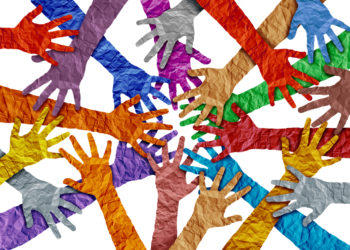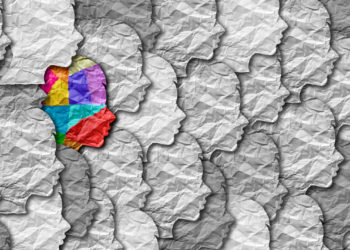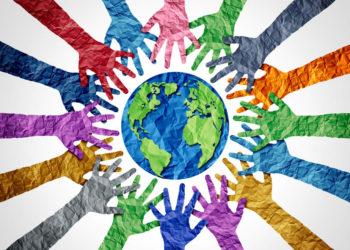Editor’s Note: Today’s post is by Maribel Gomez. Maribel is a graduate student at The George Washington University, pursuing a Master’s degree in Publishing. With a background spanning over a decade in the field of education, Maribel possesses a deep-seated commitment to empowering underrepresented voices and fostering diversity, equity, and inclusion as an active member of the DEIA committee at the Society for Scholarly Publishing.
Racial battle fatigue (RBF) is the cumulative outcome of a natural stress response related to race, triggered by distressing mental and emotional conditions. These conditions arise from consistently encountering dismissive, demeaning, insensitive, and/or hostile racial environments or individuals. Coined by William Smith in 2004, the term was initially associated with African American men, but has since been extended to encompass racially marginalized groups more broadly. The daily experience of micro and macro aggressions in various settings inflicts race-targeted stress on people of color.
What are the symptoms of Racial Battle Fatigue?
Racial Battle Fatigue induces mental, emotional, and physical strain among People of Color, leading to psychophysiological symptoms. These stressors can result in long-term health effects and significantly impact a person’s self-worth and confidence. Many individuals may manifest one or more of the symptoms outlined below:
- Anger
- Depression
- Exhaustion
- Headaches
- Helplessness
- High blood pressure
- Hypersensitivity
- Hypervigilance
- Insomnia
- Irritability
- Mental burnout
- Rapid breathing
- Self-censorship
- Social isolation
- Social withdrawal
- Stress/anxiety
- Ulcers
- Upset stomach
What is Racial Trauma?
“Racial trauma, or race-based stress denotes the physical and psychological symptoms experienced by Black, Indigenous, and People of Color (BIPOC) following exposure to particularly distressing and/or life-threatening racist encounters perpetrated by white supremacist individuals, policies, and systems.”
Racial trauma encompasses both a specific incident of racial discrimination and the cumulative emotional toll of enduring such discrimination over time. Individuals may undergo racial trauma directly or indirectly, witnessing others being mistreated due to their race. Over time, this can lead to conditions such as PTSD, stress, and anxiety, significantly impacting daily functioning in academic, professional, and domestic settings. For BIPOC individuals entrenched in a systematically racist paradigm, racial trauma becomes an inevitable and impactful aspect of their experiences. The enduring effects of racial trauma can persist across generations.
A coping strategy employed by People of Color in a hostile environment is known as “John Henryism”. This concept proposes that stressors linked to oppression, such as poverty and unequal employment opportunities, prompt some Black individuals to adopt a coping triumvirate characterized by “efficacious mental and physical vigor, a strong commitment to hard work, and a single-minded determination to succeed.” In other words, it manifests as a form of high-achiever perfectionism. This manifestation of effortful vigor involves a relentless pursuit of goals despite systemic barriers. It signifies a refusal to succumb to external pressures and a determination to exert agency in the face of adversity. However, this sustained effort can take a significant psychological and physical toll over time. Unsurprisingly, racial disparities contribute to adverse hypertension outcomes, resulting in higher morbidity rates compared to their white counterparts.
This often leads to feelings of distress, as individuals find themselves exerting extra effort to establish their position in the workplace. This often results in feelings of distress as individuals find themselves exerting twice the effort to secure their position in the workplace. The distress arises from the paradox of working diligently to overcome systemic barriers while simultaneously bearing the burden of heightened expectations. Individuals frequently navigate a delicate balance, investing additional effort to meet the demands of work or other domains. Unfortunately, this pursuit often takes a toll on their well-being and mental health.
Navigating Racial Trauma
Rejuvenating Activities:
Allocating time for personal well-being is crucial in navigating racial trauma. Engaging in activities like walks, immersing oneself in nature, appreciating music, practicing yoga, meditation, aromatherapy, and pursuing creative outlets proves invaluable for unwinding and alleviating the physical toll of stress. These activities not only provide momentary relief but contribute to long-term resilience. Incorporating a variety of rejuvenating activities into one’s routine establishes a holistic approach to self-care.
Social Support:
Establishing connections with empathetic individuals and fostering a supportive network is a vital aspect of coping with racial trauma. Sharing emotions and engaging in conversations with understanding peers or friends aids in effective emotional processing. Beyond emotional processing, social support acts as a buffer against the isolation that often accompanies traumatic experiences. Building a network of allies and advocates provides a sense of belonging and solidarity. This network becomes a valuable resource for mutual understanding, validation, and the exchange of coping strategies, fostering a community of resilience.
Advocacy:
Transforming emotions like rage and helplessness into community engagement is a powerful strategy for navigating racial trauma. Advocacy work not only connects individuals with like-minded allies but also contributes to positive societal change. Engaging in advocacy involves actively addressing the root causes of racial trauma. This may include participating in community initiatives, supporting organizations that promote equity, and raising awareness about systemic issues. By transforming personal distress into a catalyst for change, individuals contribute to dismantling oppressive structures and fostering a more just and inclusive society.
Professional Assistance:
Seeking trauma-informed individual therapy or group counseling provides beneficial avenues for addressing concerns and processing experiences related to racial trauma. Professional assistance offers a structured and supportive environment for deeper exploration and healing. Trauma-informed therapists specialize in understanding the impact of racial trauma, providing tailored strategies for coping and growth. Group counseling, on the other hand, offers a communal space for shared experiences and collective healing, emphasizing that individuals are not alone in their struggles. Incorporating these strategies into one’s coping repertoire forms a comprehensive approach to navigating racial trauma, fostering personal resilience, and contributing to broader social change.
While these coping mechanisms can offer individual relief, it is essential to acknowledge the broader imperative of collaborative efforts to eradicate all manifestations of inequity, discrimination, and marginalization within various spheres, including the workplace, schools, and access to comprehensive mental and general healthcare.
Addressing healthcare disparities is crucial. The 2020 United States Census highlights that 49.6% of Americans identify as belonging to an ethnic or racial minority, underscoring the pressing need for ensuring equitable access to both mental and general healthcare for these populations. Ensuring that minorities have equitable access to mental and general healthcare involves dismantling systemic barriers such as financial constraints, cultural biases, and inadequate representation. Initiatives that focus on providing culturally competent care, reducing stigma, and increasing the accessibility of mental health resources can pave the way for a more equitable healthcare landscape.
In essence, while coping mechanisms offer individual support, the imperative for systemic change, especially in realms such as healthcare, workplaces, and education, is underscored by the fact that nearly half of Americans identify as ethnic or racial minorities, facing barriers that hinder their access to essential resources. As we strive for a more equitable and inclusive future, the collective commitment to changing oppressive structures will not only alleviate the burdens of racial battle fatigue and trauma but also pave the way for a society that fosters the well-being and potential of every individual, regardless of their ethnic or racial background.
Discussion
1 Thought on "Guest Post – Mental Health Awareness: What is Racial Battle Fatigue?"
Thank you for your well-written, insightful post. You’ve articulated issues in a way that encourages understanding and empathy and gives me an enhanced perspective on what individuals who identify as BIPOC experience. I appreciate the time you have taken to distill research and the inclusion of the Racial Battle Fatigue handout is a great addition.




